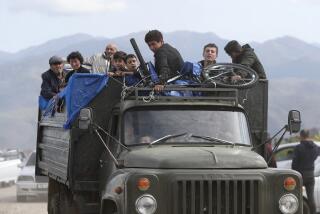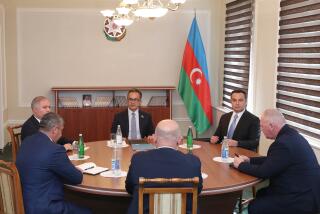Choice of Interim Leader Draws a Mixed Response
- Share via
QUETTA, Pakistan — Afghans in the region had a mixed response Wednesday to the announcement that an urbane 44-year-old Pushtun tribal chief, Hamid Karzai, had been named to lead their nation’s interim government.
Here in Quetta, Karzai’s home for much of the past two decades, residents were mainly enthusiastic about his selection by four Afghan factions meeting in Germany.
“For the first time we will have a prime minister who is not a criminal,” noted Baryallai Hellali, a refugee from Farah province in western Afghanistan.
In the northwestern Pakistani city of Peshawar, home to the largest concentration of Afghans outside their homeland, there also were signs of hope and support, especially among intellectuals.
“Karzai is far better than these fundamentalists,” noted Tahira, a former lecturer at Kabul University’s department of philosophy, who gave only her first name. She said her dream was that Karzai could start Afghanistan on the road to peace and restore freedom to all Afghans--including women, whose public lives were greatly restricted under the Taliban.
But there was also dissent over the choice of Karzai, who was slightly injured Wednesday when a bomb from an American B-52 exploded among anti-Taliban forces near the southern Afghan city of Kandahar, killing three U.S. special operations soldiers and five Afghans.
Mohammed Daoud, a shopkeeper who two years ago fled Kandahar for Quetta, argued to the nods of the people who had gathered around him that Karzai was too young and inexperienced for the job. The tribal chief has spent too little time inside Afghanistan, Daoud added.
“I don’t like him,” Daoud said matter-of-factly.
For most of those interviewed, however, the determining factor in their decision to support the choice for interim leader was that the appointment receives the blessing of the former Afghan king, Mohammad Zaher Shah, who is a relative of Karzai.
Abu Bakar Agha Jan, a Muslim spiritual leader and refugee from Kandahar, put it this way: “If Karzai has been selected by Zaher Shah, then I will accept him, but I do not believe he is the right man for the job. He doesn’t have enough political influence to bring peace to Afghanistan.”
The Northern Alliance’s foreign minister, Abdullah, who will retain his post in the new interim authority, defended Karzai’s selection.
“He is young, he is educated and an intellectual,” Abdullah told reporters in Kabul, the Afghan capital. “He is the person that will put the interest of the Afghan nation above any other. And I hope, and I believe, we will be able to work together for the common cause, which is achieving a lasting peace in Afghanistan and reconstruction of the country.”
Karzai, who speaks fluent English and French in addition to his native Pashto and the Urdu language of Pakistan, is not only well educated but also well traveled and outward-looking. He was Afghanistan’s deputy foreign minister from 1992-94.
However, the greatest asset Karzai brings to the job is the combination of strong tribal roots and a progressive political outlook. He is the acknowledged chief of the Popolzai clan, part of Zaher Shah’s Durrani tribe.
Karzai was born in Kandahar to a family that eventually included seven boys and a girl. Karzai’s father, chief of the clan before him, was assassinated in 1999 in Quetta. The slaying was never solved.
Karzai’s family has strong American connections. Three brothers own a string of Afghan restaurants--called Helmand, after a southern Afghan province--in cities that include San Francisco, Boston, Chicago and Baltimore. Last month, he was pulled out by a U.S. military helicopter as Taliban forces threatened to overrun his fighters.
But Karzai has several handicaps as he faces his new job. He has had long periods of absence from Afghanistan since he and his family first fled in the early 1980s after an invasion by Soviet forces. In addition, the Popolzai clan’s influence extends only to three of Afghanistan’s 28 provinces.
His role as a prominent antiTaliban commander, leading a force of about 2,000 fighters that is closing in on Kandahar, could boost his credibility, especially among a people who nurture special respect for successful military leaders. Kandahar is the biggest city still in Taliban hands. Taliban leader Mullah Mohammed Omar, who took up residence there after his movement seized power in Afghanistan in the mid-1990s, is believed to be in the city.
Unlike most campaigns against the Taliban in the weeks since American airstrikes began Oct. 7, Karzai has employed his diplomatic skills more than his assembled firepower in his advance south from Oruzgan province.
Ahmed Karzai recently described how his brother has dispatched emissaries ahead at each town to meet with Taliban defenders, persuading them to withdraw peacefully. So far, the tactic has worked.
“I want to capture Kandahar without firing a shot,” Hamid Karzai told a reporter by satellite telephone this week.
He had been selected as a representative to the conference in Koenigswinter, Germany, along with other delegates from the exiled monarch’s Rome-based faction. He chose to remain in the Kandahar region to fight.
Nevertheless, he stayed in touch by telephone with the gathering’s participants, which included chief U.N. mediator Lakhdar Brahimi and U.S. envoy James Dobbins.
“We are one nation, one culture,” Karzai said in a phone call that delegates heard over a loudspeaker last week on the first day of the conference. “We are united, not divided. We all believe in Islam, but we believe in an Islam of tolerance. . . . This meeting is the path toward salvation.”
Brahimi said he had last spoken to Karzai before Wednesday’s U.S. bombing.
“He tells me he’s all right and a lot of people in Afghanistan are looking after him,” Brahimi said. “He feels well protected.”
Times staff writers Richard Boudreaux in Koenigswinter and Paul Watson in Kabul contributed to this report.
More to Read
Sign up for Essential California
The most important California stories and recommendations in your inbox every morning.
You may occasionally receive promotional content from the Los Angeles Times.













